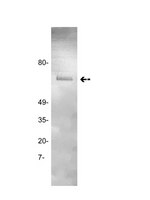Bivalent direct thrombin inhibitors: hirudin and bivalirudin.
Warkentin, Theodore E
Best practice & research. Clinical haematology, 17: 105-25 (2004)
2004
Show Abstract
Hirudin derivatives (e.g. lepirudin, desirudin) and hirudin analogues (e.g. bivalirudin) are bivalent direct thrombin inhibitors; that is, they bind to two distinct sites on thrombin-its active (catalytic) site and its fibrinogen-binding site (exosite 1). These bivalent binding properties contribute to their high affinity and high specificity for thrombin. This review compares the pharmacological properties of these agents, and describes studies of their efficacy and safety in diverse clinical settings such as immune heparin-induced thrombocytopenia, postoperative antithrombotic prophylaxis, and treatment of acute coronary syndrome. Certain disadvantages of hirudin, such as its predominant renal excretion and immunogenicity, have been overcome through development of the hirudin analogue, bivalirudin. Compared with hirudin derivatives, bivalirudin exhibits a shorter half-life (25 vs 80 minutes), predominant non-renal (enzymic) metabolism, and low immunogenicity. Further work is required to define the scope of clinical thrombosis problems that could benefit from these novel agents. | 15171961
 |
Thrombin domains: structure, function and interaction with platelet receptors.
De Cristofaro, Raimondo and De Candia, Erica
J. Thromb. Thrombolysis, 15: 151-63 (2003)
2003
Show Abstract
Thrombin plays a pivotal role in different biological phenomena, such as hemostasis, thrombosis, and cell differentiation. Indeed this protease catalyzes the conversion of fibrinogen into fibrin, the activation of coagulation factors V, VIII, XI, and XIII, but is also involved in the activation of many cell types and platelets. Thrombin bears some recognition domains and insertion loops, not found among other serine proteases of the coagulation system. In this review the properties of these thrombin domains, which regulate the specificity of the enzyme's interaction with substrates and inhibitors, are particularly emphasized. The example of thrombin interaction with the platelet membrane receptors, namely GpIb and PAR1, shows how the concerted action of the insertion loops and recognition domains is the key to solve the apparent enigma as to how thrombin can be at the same time a very efficient and specific enzyme for different substrates and inhibitors. | 14739624
 |
The role of the tissue factor-thrombin pathway in cardiac ischemia-reperfusion injury.
Mackman, Nigel
Seminars in vascular medicine, 3: 193-8 (2003)
2003
Show Abstract
This article focuses on the role of the tissue factor (TF)-thrombin pathway in cardiac ischemia-reperfusion (I/R) injury. We and others have used rabbit models of cardiac I/R injury to show that anti-TF therapy prevents the transient decrease in regional myocardial blood flow, reduces platelet and fibrin(ogen) accumulation, and reduces infarct size. At present, the mechanism by which TF-initiated coagulation contributes to myocardial injury is not established. Inhibition of TF may decrease intravascular fibrin deposition and thrombosis. However, immunohistochemical studies demonstrated that fibrin deposition was predominantly within the myocardium and depletion of fibrinogen did not reduce infarct size. In contrast, inhibition of thrombin reduced infarct size to a similar extent as anti-TF therapy. We propose that the TF-thrombin pathway may contribute to myocardial injury by an additional mechanism that is not dependent on fibrin deposition but involves activation of protease activated receptor 1 (PAR-1) on vascular endothelial cells and cardiac myocytes. Anti-TF therapy would inhibit both thrombin-dependent fibrin deposition and thrombin-dependent PAR-1 signaling. | 15199482
 |










